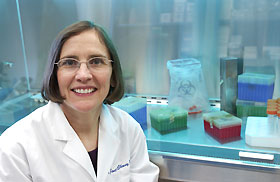Health Center Physician Working
To Increase Efficiency Of Flu Shots
 |
|
Dr. Janet McElhaney, who specializes in research on flu vaccines, at her lab at the Health Center. |
| Photo by Peter Morenus |
The Health Center’s strategic plan and vision statements call for basic research to be translated into bedside products and services, and for the institution to help people achieve and maintain healthy lives and restore wellness and health to maximum attainable levels.
Dr. Janet McElhaney, associate professor of medicine, is living those initiatives.
McElhaney, of the Center for Immunotherapy of Cancer and Infectious Diseases, is investigating the immune system of elderly people and she’s developing tools to screen new vaccines for improved efficacy.
“My primary research interest is the aging immune system, and how vaccines can be used to prevent illness,” she says. “We’re looking into measuring the immune response to influenza vaccination and trying to correlate poor immunologic responses to whether patients get the flu.
“The idea behind the work is to find out who are the very high-risk adults not protected by current vaccines, and develop assays that will be used to screen new vaccines for improved efficacy in older people.”
Current vaccines are only 30 to 40 percent effective in older adults, she says, less than half as effective as they are in younger people. Even with those relatively low numbers, vaccines save a lot of money by preventing many hospitalizations of older people – including those with heart or lung disease – suffering from the flu.
Flu is one of the most vaccine-preventable diseases, she says. Increase the efficacy of the vaccine and the numbers of elderly and chronically ill elderly who are vaccinated, and you gain improvements between 50 and 75 percent. In addition to preventing suffering, the savings from not having to hospitalize those people are gigantic.
A Canadian who was on the faculty of Eastern Virginia Medical School, McElhaney was recruited to the Health Center in 2003 by Pramod Srivastava, professor of medicine and director of the Center for Immunotherapy of Cancer and Infectious Diseases, and Dr. George Kuchel, an associate professor of medicine, director of the UConn Center on Aging, and chief of the Division of Geriatric Medicine.
She holds federal grants including one from the NIH, and was recently awarded a $600,000, five-year Patrick and Catherine Weldon Donaghue Medical Research Foundation grant. In the lab she has a number of projects, including research into the enzyme granzyme B, an immunologic mediator that’s lower in people who get the flu than in those who don’t.
She’s also investigating Respiratory Syncytial Virus (RSV), a flu-like respiratory illness most commonly seen in infants but is one that is increasingly being recognized as a very important cause of flu-like illnesses in the 65 and older population.
In older people, influenza and RSV cannot be clinically distinguished from each other, she says. Developing a vaccine against RSV would be an important leap in improving the health of the elderly.
Economics, and the difficulties associated with developing and testing vaccines, have caused the science to lag.
“We’re still using the same vaccines we used 30 year ago,” she says. “So right now, there’s really no new technology for vaccine development that is targeted to older adults in the U.S. Many people are working on pandemic flu vaccines, but many of those are based on current technologies that may not be effective in older people in the event of a pandemic.
“We’re losing ground in terms of protection of older people,” she says, “and if we have pandemic flu, it’s likely to be devastating because we don’t have the right vaccines to protect them.”
Her lab work doesn’t prevent her from seeing patients: in fact, her research sends her into patient’s homes to gather samples and to advocate flu vaccination. She always gets a flu shot to prevent her from spreading the flu to patients.
A portion of the Donaghue grant will be used to promote vaccination in the community. Together with personnel from the Institute for Community Research in Hartford, McElhaney is visiting ethnically diverse seniors living in congregated housing, to address the issue of disparities in vaccination rates between minorities and others in the population, and to develop an intervention to boost the numbers of people who accept vaccination in this setting.
“We’re looking to find ways to improve vaccine uptake,” she says. “Then we can use the same model when newer vaccines arrive. We are working with the community to run their own flu vaccine campaigns, answer questions from other residents, and do their best to get their neighbors vaccinated.”
McElhaney’s academic activities round out her laboratory and clinical work. She and Dr. Lawrence Raisz, Board of Trustees Distinguished Professor of Medicine, are principals of the Clinical Research Interdisciplinary Scholars Program, begun last year, a program to train residents, fellows, and junior faculty in clinical research.
NIH, as part of its initiative to promote translational and clinical research across disciplines, has issued a request for applications for those developing pre-doctoral clinical research training programs. Under the leadership of Dr. Henry Kranzler, professor of psychiatry and assistant dean for clinical research, the Clinical Research Interdisciplinary Scholars Program – which is intended to improve collaboration among health disciplines across the University – is responding to the initiative.
UConn is very well positioned to move into this because of its strong basic science,” McElhaney says.“The NIH roadmap is intended to get research translated into positive health outcomes for people. Several disciplines involved and working together are what’s really needed to make that happen.”

